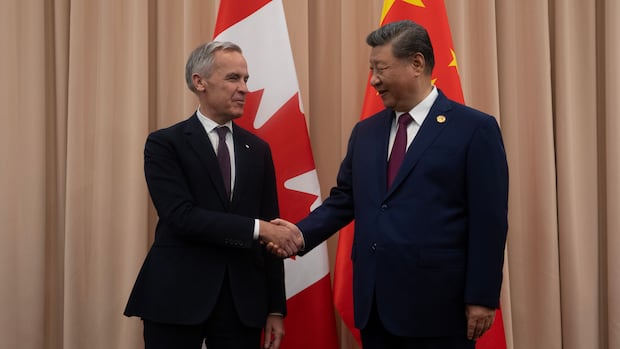World
Canada and China Explore New Trade Relations Amid U.S. Tensions

Prime Minister Mark Carney is advocating for a strategic reset in Canada-China relations during his attendance at the G20 summit in South Africa. This summit comes as the United States, under Donald Trump, boycotts the event, highlighting a significant shift in the global economic landscape. As Canada seeks to diversify its international partnerships amidst a complex and often unpredictable relationship with the U.S., efforts to strengthen ties with China will require careful navigation of both opportunities and risks.
Carney’s recent meeting with Chinese President Xi Jinping at the Asia-Pacific Economic Cooperation summit in South Korea has been described as “long overdue” and a potential turning point for bilateral relations. This engagement marks the first formal leader-to-leader contact between Canada and China since 2017. Despite concerns about being late to the table, analysts suggest that Canada can still capitalize on opportunities to enhance trade, aiming to double its non-U.S. exports over the next decade.
Trade Expansion and Strategic Opportunities
China is currently Canada’s second-largest trading partner, with exports projected to reach $30 billion in 2024. Despite this, Chinese exports constitute only about five percent of Canada’s total exports, a stark contrast to the approximately 75 percent directed towards the U.S. The Canada-China Business Council (CCBC) has indicated that there is significant room for growth, particularly in natural resources and agricultural products such as lumber, pork, and beef.
To facilitate increased trade, analysts propose addressing existing trade tensions, notably by reconsidering the 100 percent tariff on Chinese electric vehicles, which is currently under review by the federal government. In response, China has imposed counter-tariffs on various Canadian goods, including canola, seafood, and pork, leading to estimated economic impacts in the billions.
Greg Chin, an associate professor of political science at York University, emphasized the challenges faced by Canadian farmers, stating, “If it was so easy for our canola farmers to pivot to other markets, we would have done it.” This highlights the urgency for Canada to explore new avenues for trade expansion.
Collaborative Ventures in Technology and Research
Beyond traditional trade, opportunities for collaboration in research and development, manufacturing, and services are increasingly critical. As China emerges as a leading technology power, some experts argue that Canada should consider partnerships rather than competition in sectors like electric vehicle battery production and artificial intelligence.
Colin Robertson, a former Canadian diplomat and vice-president at the Canadian Global Affairs Institute, advocates for potential partnerships with China to bolster Canada’s competitiveness. He notes that such collaborations could be vital for sustaining the Canadian auto sector in light of U.S. market dynamics.
With China holding significant resources in critical minerals, Canada has the chance to enhance its mining sector while accelerating its own green transition. As the Canadian Climate Council warns that Canada may not meet its 2030 emissions target, leveraging China’s expertise in cleaner energy technologies could provide mutual benefits.
The Communist Party of China has outlined its commitment to self-reliance in technology, focusing on areas such as artificial intelligence. Chin suggests that Canada should actively seek to collaborate in this field, particularly in establishing governance frameworks for AI.
The renewed focus on soft power is another avenue for strengthening ties between the two nations. Historically, Canada has benefitted from a strong influx of Chinese students, and the CCBC believes this relationship can be rekindled. Education and tourism sectors stand to gain from improved relations, especially as Canada has been re-approved for Chinese group tours following a previous travel ban related to the arrest of Huawei’s chief financial officer in Vancouver.
Lynette Ong, a distinguished professor of Chinese politics at the University of Toronto, emphasizes the importance of soft power, suggesting that increased foreign aid in the Indo-Pacific region could enhance Canada’s influence as the U.S. reduces its presence. “Aid is a very good way to buy soft power,” Ong stated, urging a robust commitment to this approach.
As Canada navigates its future relationship with China, analysts stress the importance of acknowledging the differences between the two countries’ political systems. Robertson notes that lawmakers must remain vigilant regarding issues such as human rights and cybersecurity as they develop a comprehensive strategy for engagement.
In summary, while challenges persist in Canada-China relations, the potential for strategic partnerships across various sectors remains promising. By addressing trade barriers, exploring collaborative ventures in technology, and leveraging soft power, Canada can work towards a more balanced and mutually beneficial relationship with China in an evolving global landscape.
-

 Politics3 weeks ago
Politics3 weeks agoSecwepemc First Nation Seeks Aboriginal Title Over Kamloops Area
-

 World4 months ago
World4 months agoScientists Unearth Ancient Antarctic Ice to Unlock Climate Secrets
-

 Entertainment5 months ago
Entertainment5 months agoTrump and McCormick to Announce $70 Billion Energy Investments
-

 Lifestyle4 months ago
Lifestyle4 months agoTransLink Launches Food Truck Program to Boost Revenue in Vancouver
-

 Science5 months ago
Science5 months agoFour Astronauts Return to Earth After International Space Station Mission
-

 Technology3 months ago
Technology3 months agoApple Notes Enhances Functionality with Markdown Support in macOS 26
-

 Top Stories2 months ago
Top Stories2 months agoUrgent Update: Fatal Crash on Highway 99 Claims Life of Pitt Meadows Man
-

 Lifestyle3 months ago
Lifestyle3 months agoManitoba’s Burger Champion Shines Again Amid Dining Innovations
-

 Sports5 months ago
Sports5 months agoSearch Underway for Missing Hunter Amid Hokkaido Bear Emergency
-

 Politics4 months ago
Politics4 months agoUkrainian Tennis Star Elina Svitolina Faces Death Threats Online
-

 Politics4 months ago
Politics4 months agoCarney Engages First Nations Leaders at Development Law Summit
-

 Technology5 months ago
Technology5 months agoFrosthaven Launches Early Access on July 31, 2025




















